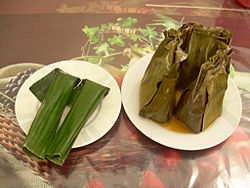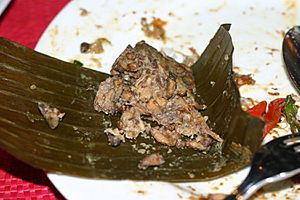Botok facts for kids

Unopened botok in banana leaves wrapping.
|
|
| Alternative names | Bobotok, Botok-botok |
|---|---|
| Course | Main course |
| Place of origin | Indonesia |
| Region or state | Central Java, Yogyakarta, East Java |
| Serving temperature | Hot or room temperature |
| Main ingredients | Grated coconut with various ingredients (tempeh, tofu, anchovy, fish, meat or mushroom) spiced and steamed in banana leaf |
| Variations | Buntil, Pepes, Otak-otak |
Botok is a yummy traditional dish from Java in Indonesia. It's made with shredded coconut that's been squeezed to remove its milk. People mix it with other tasty things like veggies or fish. Then, it's wrapped in a banana leaf and steamed until it's cooked!
You'll often find Botok in places like Yogyakarta Special Region, Central Java, and East Java. It's usually eaten with rice.
Botok might have started as a way to use up coconut bits left over from making coconut milk. Instead of throwing them away, people found a clever way to turn them into a delicious meal! Today, many recipes use fresh coconut to make Botok even tastier.
Contents
How to Make Botok
Making Botok is quite simple! First, shredded coconut is mixed with spices. These often include chilli, salt, pepper, lemon basil, and salam leaves (which are like Indonesian bay leaves).
Adding Ingredients
After mixing the coconut and spices, other ingredients are added. These can be simple and cheap, like minced tempeh, tofu, or anchovy.
Wrapping and Steaming
The mixture is then placed on a piece of banana leaf. The leaf is carefully wrapped up tight and held closed with a small stick. Finally, these little packages are put into a steamer.
Serving Botok
Once the Botok is cooked, the banana leaf package is opened. The cooked coconut and any added egg help hold all the ingredients together. It's then ready to be served and enjoyed with steamed rice.
Different Kinds of Botok
Botok can be made with many different ingredients to add flavor and nutrients. Here are some popular kinds of Botok:
- Botok ares (made with the core of a banana trunk)
- Botok belimbing wuluh (made with a sour fruit called Averrhoa bilimbi)
- Botok beluntas (made with Pluchea indica leaves)
- Botok daging (made with minced beef)
- Botok jamur (made with mushrooms)
- Botok lele (made with catfish)
- Botok mlanding (made with petai cina or lamtoro)
- Botok ontong (made with banana flower buds)
- Botok tawon (made with bee larvae from honeybees)
- Botok tahu (made with tofu)
- Botok tempe (made with tempeh)
- Botok telur (made with egg)
- Botok telur asin (made with salted egg)
- Botok tengiri (made with wahoo fish)
- Botok teri (made with anchovy)
- Botok tempe tahu teri (a mix of tofu, tempeh, and anchovy)
- Botok udang (made with shrimp)
- Botok wader (made with Silver rasbora fish)
Botok's Relatives
There are other dishes that are a bit like Botok.
Buntil
Buntil is made in a similar way to Botok. However, instead of banana leaves, it uses papaya or cassava leaves to wrap the ingredients. This means the wrapping itself is edible!
Pepes
Botok is often seen as a type of pepes. Pepes is a general cooking method where food is wrapped in banana leaves and then steamed or grilled. The main difference is that Botok always uses shredded coconut, while pepes usually doesn't.
Bobotie
The South African dish called bobotie is thought to have come from Indonesian bobotok. But they are quite different now! Bobotie uses minced beef and eggs, but it doesn't have shredded coconut or the banana leaf wrapping. In bobotie, beaten eggs, milk, and shredded bread help bind the ingredients together, similar to how coconut and eggs work in botok.
See also
 In Spanish: Botok para niños
In Spanish: Botok para niños
 | Jewel Prestage |
 | Ella Baker |
 | Fannie Lou Hamer |


